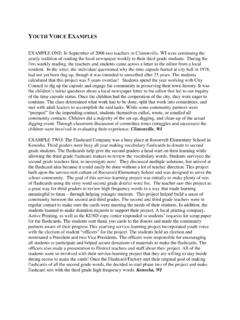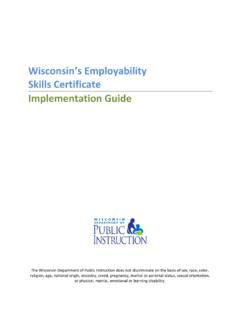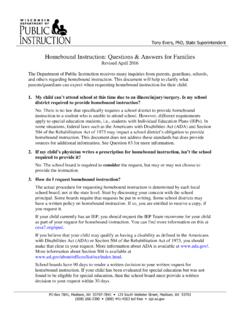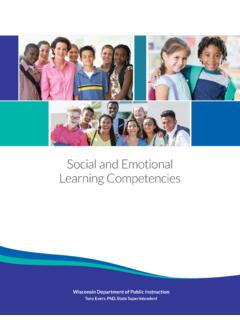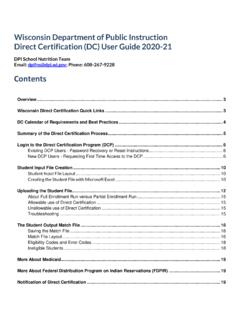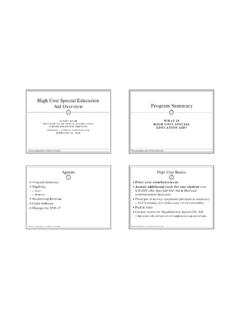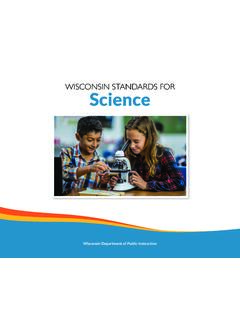Transcription of Wisconsin Standards for Social Studies
1 Wisconsin Department of Public InstructionWISCONSIN Standards FOR Social StudiesWisconsin Department of Public Instruction Wisconsin Standards FOR Social Studies Wisconsin Department of Public Instruction Tony Evers, State Superintendent Madison, Wisconsin Wisconsin Standards for Social Studies ii This publication is available from: Wisconsin Department of Public Instruction 125 South Webster Street Madison, WI 53703 (608) 266-8960 May 2018 Wisconsin Department of Public Instruction The Wisconsin Department of Public Instruction does not discriminate on the basis of sex, race, color, religion, creed, age, national origin, ancestry, pregnancy, marital status or parental status, sexual orientation; or ability and provides equal access to the Boy Scouts of America and other designated youth groups.
2 Wisconsin Standards for Social Studies iii Table of Contents Foreword .. iv Acknowledgements .. v Section I: Wisconsin s Approach to Academic Standards .. 1 Purpose of the Document .. 2 What Are the Academic Standards ? .. 3 Relating the Academic Standards to All Students .. 4 Ensuring a Process for Student Success .. 5 References .. 6 Section II: Wisconsin Standards for Social Studies .. 7 What is Social Studies Education? .. 8 Wisconsin s Approach to Standards in Social Studies .. 8 Standards Structure .. 10 Definitions .. 11 Social Studies Strands .. 12 At-A-Glance .. 14 Standards , Learning Priorities, and Performance Indicators for Social Studies .. 15 Section III: Discipline: Social Studies (SS) Standards .
3 16 Content Area: Social Studies Inquiry Practices and Processes (Inq) .. 17 Content Area: Behavioral Sciences (BH) .. 22 Content Area: Economics (Econ) .. 26 Content Area: Geography (Geog) .. 35 Content Area: History (Hist) .. 42 Content Area: Political Science (PS) .. 49 Wisconsin Standards for Social Studies iv Foreword On May 29, 2018, I formally adopted the Wisconsin Standards for Social Studies (2018). This new set of academic Standards provides a foundational framework that identifies what students should know and be able to do in Social Studies . The adoption of the Wisconsin Standards for Social Studies was part of a concerted effort led by Wisconsin educators and stakeholders who shared their expertise in Social Studies and teaching from kindergarten through higher education.
4 The public and legislature provided feedback for the writing committee to consider as part of Wisconsin s Academic Standards Review and Revision Process. Social Studies is composed of deep and enduring understandings, content, inquiry, concepts, and skills from the fields of geography, history, political science and civics, economics, and the behavioral sciences. Social Studies prepares our young people to be college, career, and community ready. The knowledge and skills described in the new Standards provide guidance to educators across the state regarding what students should know and be able to do in each of the four grade bands (K-2, 3-5, 6-8, 9-12). These Standards emphasize the concept of inquiry in the Social Studies classroom, and encourage teachers and districts to provide meaningful ways for students to be civically engaged in their communities.
5 The Wisconsin Department of Public Instruction will continue to build on this work to support implementation of the Standards with resources for the field. I am excited to share the Wisconsin Standards in Social Studies , which aim to build skills, knowledge, and engagement opportunities in geography, history, political science, economics, and the behavioral sciences for all Wisconsin students. Tony Evers, PhD State Superintendent Wisconsin Standards for Social Studies v Acknowledgements The Wisconsin Department of Public Instruction (DPI) wishes to acknowledge the ongoing work, commitment, and various contributions of individuals to revise our state s academic Standards for Social Studies .
6 Thank you to the State Superintendent s Standards Review Council for their work and guidance through the Standards process. A special thanks to the Social Studies Writing Committee for taking on this important project that will shape the classrooms of today and tomorrow. Thanks to the many staff members across the division and other teams at DPI who have contributed their time and talent to this project, particularly kevin Anderson, Sara Baird, Pamela Delfosse, Marci Glaus, Audrey Lesondak, David O Connor, Julie Palkowski, David Thomas, and Chris Tiedje. Finally, a special thanks to Wisconsin educators, businesspeople, parents, and citizens who provided comment and feedback to drafts of these Standards .
7 Wisconsin Standards for Social Studies Writing Team Co-Chairs: Corey Thompson, Cardinal Stritch University Che Kearby, Kenosha Unified School District DPI Liaison: Kris McDaniel, Social Studies Consultant, DPI Jacob Bertagnoli, Lincoln HS Sandra Brauer, North Woods International School Kimberly Cade, Viroqua Elementary Carrie Carlson, North HS Joel Chrisler, Sauk Prairie HS Craig Clauson, Edgewood HS Tony DeVine, Dr. Rose Minoka-Hill School Lyman Elliott, Madison Metropolitan School District Matt Fry, Lancaster MS Tom Fugate, Homestead HS E-Ben Grisby, West HS Dr. Jennifer Hafer, UW-River Falls Anne Hasse, Wakanda Elementary Pam Kaiser, Osceola HS Mike Ketola, Northwestern MS Todd Kornack, Chippewa Falls HS Sara Kreibich, Somerset HS Emily Lovell, Holmen MS Jodi Mallak, Wittenberg Elementary Andrew Martin, James Madison Academic Campus Matthew Mauk, Oshkosh West High Parisa Meymand, Central HS Sherri Michalowski, Wisconsin Hills MS Connie Michaud, Fairview School Jennifer Morgan, West Salem MS David Olson, James Madison Memorial HS Erin Patchak, Bay View MS kevin Podeweltz, Riverside Elementary Vicki Porior, Carl Traeger MS Andy Riechers, Belmont Jr/Sr HS Amber Seitz, Wisconsin Bankers Association Kyle Smith, Superior HS Chuck Taft.
8 University School of Milwaukee Ann Viegut, John Muir MS Jen Wachowski, Mishicot HS Michelle Wade, Milwaukee Public Schools Paul Walter, Slinger MS Rhonda Watton, Templeton MS Michael Yell, Hudson MS Brent Zinkel, Wausau East HS Wisconsin Standards for Social Studies vi Department of Public Instruction, Academic Standards John W. Johnson, Director, Literacy and Mathematics, and Director for Academic Standards Meri Annin, Lead Visual Communications Designer Marci Glaus, Strategic Communications Consultant David McHugh, Education Consultant for Strategic Planning and Professional Learning Department of Public Instruction Leaders Scott Jones, Chief of Staff, Office of the State Superintendent Sheila Briggs, Assistant State Superintendent, Division of Academic Excellence Rebecca Vail, Director.
9 Content and Learning Team Section I Wisconsin s Approach to Academic Standards Wisconsin Standards for Social Studies 2 Purpose of the Document The purpose of this guide is to improve Social Studies education for students and for communities. The Wisconsin Department of Public Instruction (DPI) has developed Standards to assist Wisconsin educators and stakeholders in understanding, developing, and implementing Social Studies course offerings and curriculum in school districts across Wisconsin . This publication provides a vision for student success and follows The Guiding Principles for Teaching and Learning (2011). In brief, the principles are: Every student has the right to learn.
10 Instruction must be rigorous and relevant. Purposeful assessment drives instruction and affects learning. Learning is a collaborative responsibility. Students bring strengths and experiences to learning. Responsive environments engage learners. Program leaders will find the guide valuable for making decisions about: Program structure and integration Curriculum redesign Staffing and staff development Scheduling and student grouping Facility organization Learning spaces and materials development Resource allocation and accountability Collaborative work with other units of the school, district and community Wisconsin Standards for Social Studies 3 What Are the Academic Standards ?
